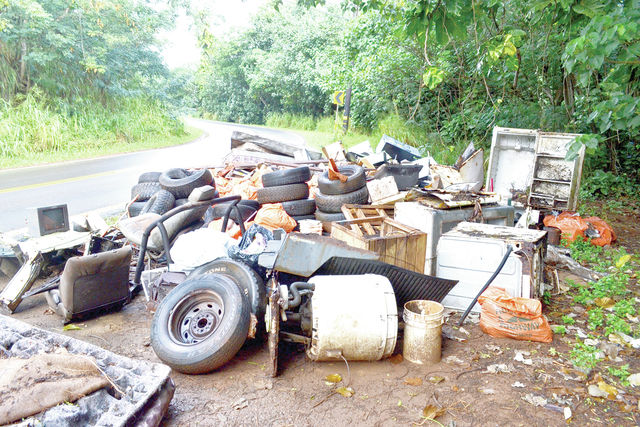KAPAIA — It’s been nearly a month since a group of volunteers cleared an illegal dumping area along Maalo Road.
But a portion of the bags of rubbish, used tires, moldy mattresses, old appliances and other junk remains.
Kapaa resident Noah Cummings said the heap of trash is an eyesore — especially for visitors who catch sight of the pile before reaching Wailua Falls.
“It’s just pilau,” he said. “The tourists come up here and see that kind stuff: It’s no good for locals; it’s no good for anyone.”
Gilbert Garcia of Simi Valley, California, thought it was odd to see a minidump on his way to the falls.
“How did they get away with that and why would you do that?” he asked. “Where I live in, we go directly to the city when something like that happens. The trash pick up is a day or two. Three weeks doesn’t seem acceptable.”
Help is on the way.
The mess will be cleared by Jan. 13, according to officials with the Hawaii Department of Transportation.
“Our Kauai District office has since been in touch with one of the volunteers and is sending a maintenance crew to pick up the trash within the HDOT right of way,” HDOT spokesperson Shelly Kunishige said in an email.
Kunishige said “a good deal” of what was left on the side of Maalo Road came from private property.
“We are coordinating with the nearby landowner on disposal of the trash that came from their property,” she said.
HDOT did not provide the identify of the landowner. Kunishige said a volunteer with the group contacted the state last week for the first time.
“If a cleanup is coordinated, we try to pick up the collected trash the next day,” Kunishige said.
About two dozen volunteers from the Phi Theta Kapaa Honor Society for Two-year Colleges and members of the Kauai Community College Sustainability Club cleared the hillside off Maalo Road on Dec. 10.
Justin Carvalho, a Kauai Community College faculty in carpentry and sustainability coordinator, organized the cleanup. He declined to comment on Wednesday.
In a previous report with TGI, Carvalho said the Kapaia hillside was used as an illegal dumping area for years and said the organizations are responsible for cleaning a portion of Maalo Road further from the dumping area via the state’s Adopt-a-Highway program.
Adopt-a-Highway groups agree to clean a 2-mile portion of state highway for at least two years and pick up litter on that part of the highway four times a year.
Maalo Road from Kuhio Highway to the end of Route 583 is under the jurisdiction of the state of Hawaii, Highways Division Jurisdiction, according to the Hawaii Department of Transportation.
Lyle Tabata, acting county engineer, said a resident contacted the county about the trash a couple of weeks ago.
“We are awaiting word from HDOT on whether this issue has been resolved,” Tabata said. “If the county’s assistance is requested with the removal of the roadside trash, we will certainly try to support their efforts.”
Illegal dumping, particularly in remote areas, has always been problematic, he said.
“We try to educate the public on proper waste disposal and encourage them to reduce, reuse and recycling items,” he said. “Most people are receptive and try to be good stewards of the environment, but unfortunately, there are some that simply don’t care.”
Tabata encourages the public to visit the county website or call public works if anyone has questions about waste disposal or recycling.
The County Department of Public Works manages a landfill in Kekaka and refuse transfer stations in Princeville, Kapaa and Hanapepe.
Gretel Sinkola of Santa Cruz, California, visited Wailua Falls on Wednesday.
She told The Garden Island the sight of the illegal dump was “awful.”
“It’s just really sad to see trash like that, as much as that it is, too: mattresses, big stuff,” she said.
She’s glad the heap isn’t bigger, but added it’s big enough to be dealt with.
Educating people about legal dumping areas ought to be an issue, she said.
“If you see trash, don’t add to it unless it’s an actual dump,” she said.




